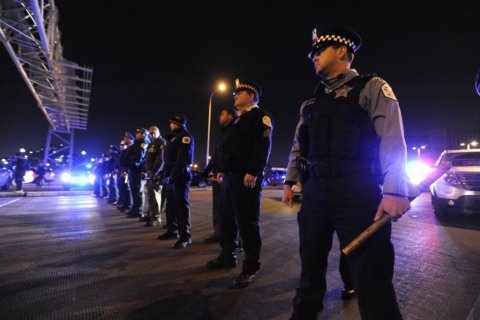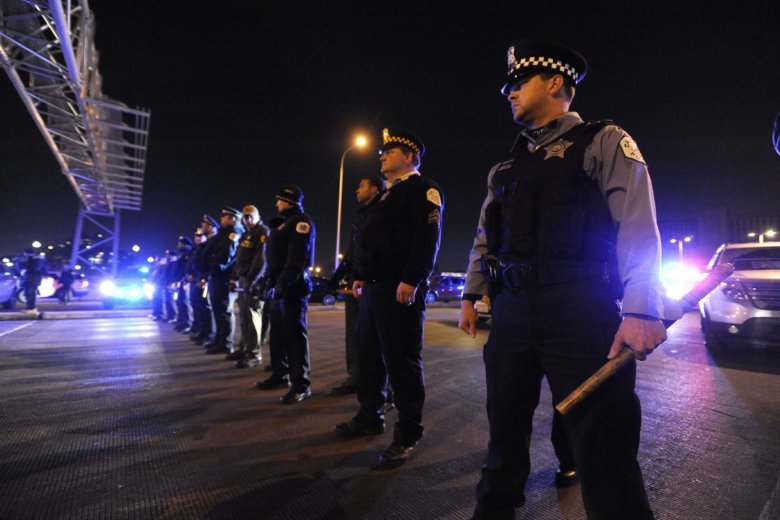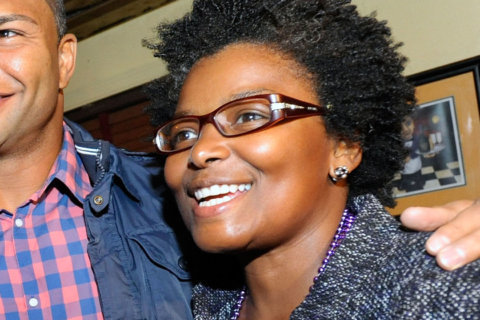This article was republished with permission from WTOP’s news partners at Maryland Matters. Sign up for Maryland Matters’ free email subscription today.

Johns Hopkins University is again trying to convince the Maryland General Assembly that the university and other JHU institutions need a full-blown private police force for campus security – arguing that other prestigious private universities in cities like Baltimore have seen results with their campus police.
In its proposal to the General Assembly, Hopkins included a study of the private police departments at the University of Chicago and the University of Pennsylvania in an effort to prove that armed campus officers can have a positive impact on both school property and in the surrounding communities. Universities routinely have security forces – but there are technical and legal differences between campus security and fully-accredited police departments.
The U.S. Department of Justice Statistics reported that the overwhelming majority of universities with campus police officers are public schools. Though some public universities in Maryland have their own police departments – the University of Maryland College Park, Morgan State University and the University of Baltimore – there are no private universities in the state with an accredited police department. Johns Hopkins is hoping to join the University of Chicago and University of Pennsylvania among the 38 percent of private colleges nationally with their own police forces whose officers are armed and separate from campus security.
Most universities without a police department have a Division of Public Safety that employ security guards to patrol campus. Hopkins has about 1,100. But for campuses located in cities like Chicago and Baltimore, unarmed security guards aren’t always a sufficient deterrent for increasingly high rates of violent crime.
The University of Chicago faces a challenge similar to Johns Hopkins: How can a prestigious university protect students, faculty members, staffers and visitors when they’re located in a neighborhood with the perception is that it is only getting more dangerous?
The University of Chicago is in a neighborhood, Hyde Park, that is considered vibrant and diverse – home to the Obama family before President Obama moved to the White House. But some of the surrounding neighborhoods are plagued with poverty and crime.
The University of Chicago Police Department (UCPD) employs about 100 officers who patrol the area and protect the 80,000 students, faculty, and residents who live nearby. The campus police monitor an area that in some places extends three miles past campus limits. The UCPD was established in 1968, though armed officers have been present on campus since the 1930s. Unlike Maryland, the state of Illinois allows private universities to establish their own private police force.
According to its website, the University of Chicago Police Department confronted an 11 percent increase in violent crime in 2017 compared to the five-year average from 2012-2016.
Marielle Sainvilus, Director of Public Affairs for the University of Chicago, said the UCPD patrol area was extended beyond campus limits at the request of neighborhood residents and merchants yearning for a greater police presence. Though it is not yet clear if the Johns Hopkins Police Department would have jurisdiction beyond campus limits, the university said violent crime in the neighborhoods surrounding each of Hopkins’ Baltimore campuses has increased anywhere from 38 percent to 67 percent between 2014 and 2017.
“UCPD leadership consistently receives positive feedback from our students and community members,” Sainvilus said.
The residents surrounding the University of Chicago may have wanted campus police in their neighborhoods at some point, but like many communities in Chicago, some of the public has lost its trust in the UCPD. A University of Chicago student group #CareNotCops held protests in early 2018 demanding the school cut funding and reduce jurisdiction for the UCPD after a campus police officer shot a 21-year-old student with bipolar disorder, Charles Thomas, as he bashed doors and cars with a metal bar. Students argued that Thomas could have and should have been subdued without the use of firearms.
Like Chicago, Baltimore has seen increasing rates of violent crime and a deep-rooted distrust between police officers and members of the community, exacerbated by the lack of consequences for the officers responsible for the death of Freddie Gray, who died in police custody in 2015. The protests, and riots that followed worsened the existing division between police and the community.
State Sen. Mary L. Washington (D-Baltimore City), whose district encompasses the Hopkins Homewood campus, strongly opposes the proposal for a private police, saying she’s concerned about transparency, accountability and the off-campus community.
“The mission of such a private police force would be to serve the interests of [Johns Hopkins],” Washington said, “not the public interest or the needs of our city.”
National accreditation
The University of Chicago attempted to take steps to improve its private police department’s accountability and transparency by adopting a “Community Oriented Policing and Problem Solving” philosophy as a strategy for community relations. This method encourages police officers to become better acquainted with members of their community, listen to their concerns and involve them in solving neighborhood problems, campus officials said. The UCPD has also been accredited by the Commission on Accreditation of Law Enforcement Agencies (CALEA), making the department one of the 5 percent of eligible law enforcement agencies to achieve this distinction.
Johns Hopkins officials, who studied the University of Chicago Police Department before making their second proposal to the General Assembly, have similar ideas to ease their neighbors’ concerns about the accountability and transparency of a private police department. Johns Hopkins University said members of community would be able to lodge complaints about campus police to a Police Accountability Board, which would be required to meet publicly at least once a year.
Johns Hopkins also proposed including two civilians on the administrative hearing board that would be tasked with investigating police misconduct. Hopkins has also proposed sending certain complaints about members of the police department to the Baltimore Civilian Review Board for more serious allegations of misconduct.
On its website, Hopkins claims that these plans would enable its police department to “involve more community oversight than any other Maryland law enforcement body.”
Washington said regardless of Hopkins’ assertion that these measures would make the private police department more transparent, she is “simply not prepared to facilitate the privatization of public safety in Maryland.”
In their roles as chairs of their respective Baltimore City delegations, state Sen. Antonio L. Hayes (D) and Del. Cheryl Glenn (D) have introduced the Community Safety and Strengthening Act as a courtesy. The bill, which would allow for the establishment of the Johns Hopkins Police Department, has received support and endorsements from Gov. Lawrence J. Hogan Jr. (R), Senate President Thomas V. Mike Miller Jr. (D-Calvert) and former New York mayor Michael Bloomberg, a Hopkins alumnus who recently donated $1.8 billion to his alma mater.
The House Judiciary Committee has a hearing on the bill scheduled for 11:30 a.m. Friday. The Senate Judicial Proceedings Committee will hear the bill at noon on Friday.








